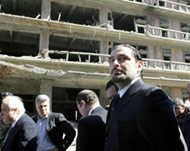Lebanese shares plunge, pound stable
Lebanese share prices have plunged on the first day of trading after the assassination of former premier Rafiq al-Hariri, while the central bank intervened to keep the Lebanese pound stable.

Market leader Solidere, the real estate giant controlled by the slain billionaire, plummeted 15% on Friday. That led to a drop of 9.48% on the BSI Index, which closed at 642.80.
Bankers said the Central Bank of Lebanon fulfilled its pledge to stabilise the national currency by intervening on the market with about $250 to $300 million. The Central Bank is said to have reserves of $10 billion.
Economy fears
“There was no panic; we had expected worse,” one banker said. “The al-Hariri effect has been amortised at least for the short term, which is significant given the gravity of the situation.
“One day of business is not really a test. We have to wait for next week to tell; we have to await political developments.”
 |
|
The blast took place in the heart |
Banks, markets and other businesses were ordered closed for three days of national mourning following the assassination.
The killing sank Lebanon deeper into political crisis over the continued Syrian domination of the country, raising concerns of repercussions on the already feeble economy.
Analysts fear for the economic health of the country – which has a public debt of about $35 billion – after the tragic end of al-Hariri, who maintained strong ties with Western and oil-rich Gulf donor states and institutions.
Pound stable
The Lebanese pound traded “at an average price of 1507.5 to the dollar, which was the same average of the last day of business on Monday,” said one bank official.
“It was business as usual, mostly thanks to the Central Bank intervention,” said one banker, adding that “the intervention is not so significant, as the bank intervenes with similar amounts in less serious circumstances.”
 |
|
Lebanon has a public debt of |
The Lebanese pound has been stable for the past 12 years. Monetary stability was one of the pillars of economic policy under al-Hariri, who was prime minister five times between 1992 and 2004.
In a bid to allay fears of uncertainty, the Central Bank pledged on Thursday to maintain the stability of the Lebanese pound and interest rates, as well as to insure liquidity.
Prominent market analyst Marwan Iskandar has expressed confidence, as “the majority of (bank) deposits, more than 70%, are in foreign currencies.”
He added that 35% of the remaining deposits are made up of obligatory reserves and treasury securities.
‘No panic’
Shares of Solidere, the firm entrusted to rebuild war-ravaged downtown Beirut after the 1975-1990 civil war, “closed at 8.08 dollars, which is about 15% lower than the closing price on Monday,” said a market analyst.
Solidere ended 2004 at $8.25 a share and was at its highest level in more than a year on Monday, at $9.50.
“There was no panic, and the drop is rather normal given the circumstances. We were expecting a greater drop,” the analyst said.
Al-Hariri was killed along with 14 other people in a massive bomb blast that ripped through his motorcade on Beirut’s seafront on Monday, causing the worst carnage seen in the Lebanese capital since the civil war.
The bomb shattered the facades of a number of Beirut’s most prominent hotels, forcing them to shut down – some for months – for renovation. It dealt a blow to hopes for a promising tourism season this year following an exceptional performance in 2004.